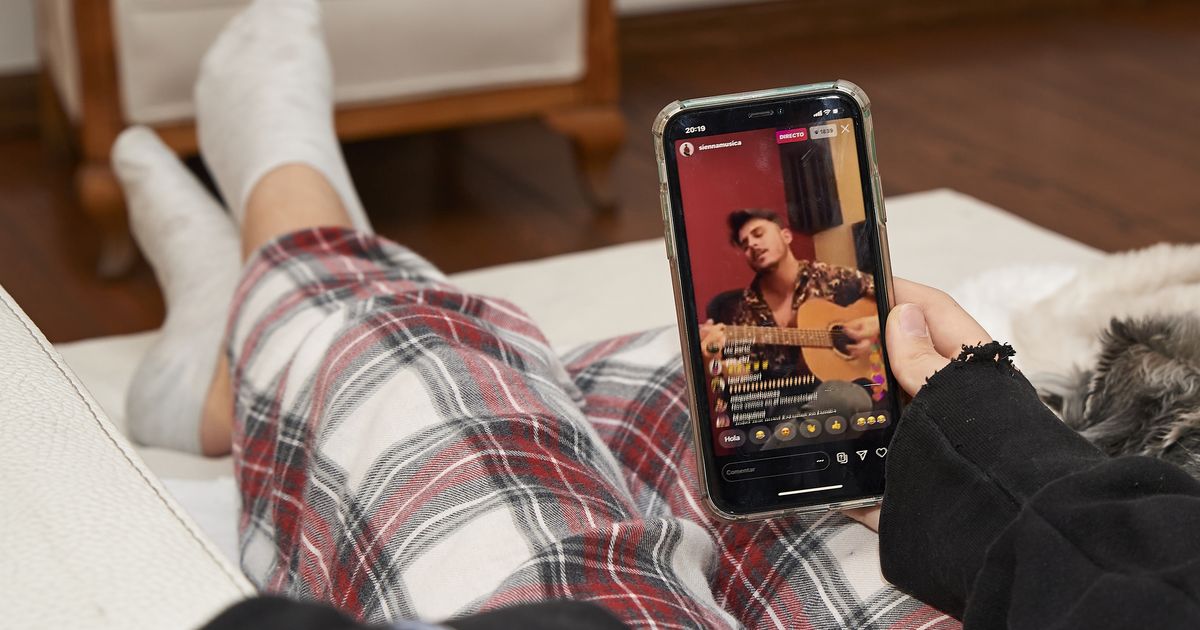
After DJ Steve Aoki gave the polo shirt-clad president of Qualcomm a tour of his phantasmagorical Las Vegas “playhouse” mansion, they sat in his studio to discuss the power 5G would bring to artists.
“I believe in the merging of not just music and technology, but of humans and technology,” Aoki said.
Aoki and Qualcomm president Cristiano Amon appeared in a pre-recorded South by Southwest (SXSW) segment that aired Friday. Aoki explained how faster internet speeds would enable him to instantly access songs from his mixer to put into live DJ mixes. Amon appeared to blow Aoki’s mind when he explained how 5G would enable fans sitting in far-away seats to livestream his performance as it was happening.
Aoki was stoked. But not everyone shared his enthusiasm.
“It would be so sad if live concerts turn into ‘buy the cheap nose-bleed seats but don’t worry because you can watch it on your phone with 5G,'” a virtual viewer named Adam Shoesmith wrote in the live comments feed.
“You’re not going to need the physical cheap seats anymore,” commenter Justin Meade replied. “Those cheap seats will be sold as intimate online experiences.”
For a music festival turned tech networking event turned series of livestreamed panels, the future of live music was appropriately top of mind at this year’s virtual SXSW. Over half a dozen talks, featuring experts from tech companies, music labels, artists, and more, tackled the topic. There was not a consensus about what the future would look like, but everyone agreed that the way artists and venues heavily relied on tech during the pandemic would have impacts after it’s over.
“Once the pandemic started, a lot of musicians instantaneously became techies,” Christian McBride, a Grammy award-winning jazz musician, said in a panel. He explained how the livestreaming phenomenon helped artists stay connected to fans, and drive some revenue. But ultimately, he noted, “music is more than something you see in a video.”
“Music is more than something you see in a video.”
The pandemic kneecapped live shows and touring, which has become a major revenue stream for musicians as album sales have dropped. A stream on Spotify typically pays less than a half of a cent, which, as Business Insider points out, means artists need 250 streams to make $1. The BBC reported on a November forecast from UK Music that predicted UK musicians would lose two-thirds of their income in 2020, with those most dependent on touring set to lose 85 percent.
Still, many musicians took advantage of livestreaming platforms to interact with fans and sell tickets to virtual shows. Data from music industry analysts show that tickets and merch for livestreamed concerts drove $600 million in revenue in 2020, and increased nearly 300 percent just between June and November 2020.
The most exciting developments in the virtual concert space, to me, were the concerts that took place in the “metaverse,” or virtual gaming spaces. Travis Scott’s Fortnite performance, or Lil Nas X’s debut of his single in the social gaming platform Roblox, are a delight to watch because of the avatar fans bopping and dancing around the virtual world. Cathy Hackl, the futurist moderator for a panel about the Metaverse, said that Lil Nas X’s Roblox performance left her son “speechless.” Watching a video of the event, the teenage YouTube narrator keeps saying over and over again “this is amazing.”
[embedded content]
Streamed concerts and live social media Q&As are all ways for artists to reach beyond the physical walls of a music venue. More technologically advanced shows, like Billie Eilish’s virtual concert complete with AR effects, might actually excite fans and make artists some money.
Some acts have gone whole hog in embracing the deepening relationship between tech and music.
One panel featured a partner at famed Silicon Valley venture capital firm Andreesen Horowitz alongside the ubiquitous pop-EDM outfit The Chainsmokers. They extolled the joining of music, tech, and entrepreneurship, and discussed The Chainsmoker’s new venture capital fund and one of their investments, the blockchain-based ticketing platform YellowHeart.
“We had the same mentality about how to approach our music career with kind of a business mind,” Andrew Taggart, one of the Chainsmokers, said. “When we started meeting founders, there was a parallel between someone starting a company, and someone starting a band.”
Not every artist may be so eager, or enthusiastic, about blending music, business, and tech. Some in the industry worry that while the tech opportunities may benefit big artists with the support of large teams, smaller artists will end up working more for less.
“Most artists don’t have experts that are helping them with their social media strategies,” Tom Windish, a longtime talent agent said in a panel. “Why would they? They’re experts at the thing they do, being a creator, and there’s all this other stuff they’re expected to do really well.”
Whether the opportunities outweigh the pitfalls, it’s clear the technological shift will have lasting effects for artists and fans.
During the metaverse panel, Roblox’s head of music, Jon Vlassopulos, noted that for some kids, “this was not only a virtual concert, but this was their first concert ever.”
Kids delighted by “live” music are exciting for both financially-motivated industry execs, and for people who just believe that more music in the world is a good thing. Considering the reality of what so many kids’ first concerts might be, however, I couldn’t stop thinking about mine: In a club, surrounded by strangers, feeling the bass vibrate through our bodies all at once. Once this pandemic is over, I hope the Roblox kids get to feeling that, too.
